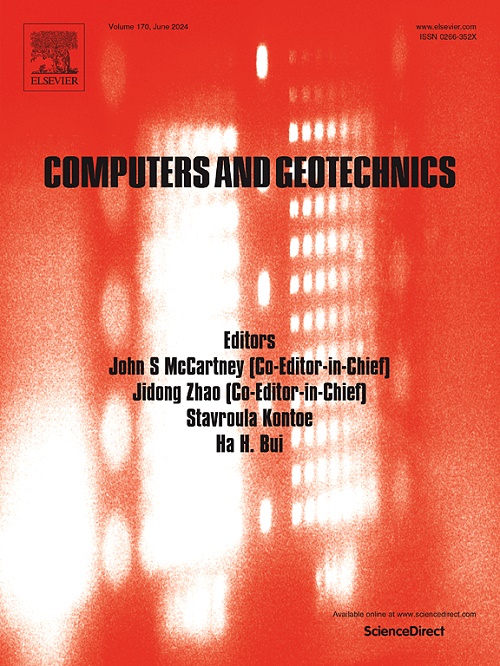Dynamic column collapse of dry granular materials with multi-scale shape characteristics
IF 6.2
1区 工程技术
Q1 COMPUTER SCIENCE, INTERDISCIPLINARY APPLICATIONS
引用次数: 0
Abstract
Understanding the fundamental principles governing granular flow dynamics has been a longstanding problem. The complexity is heightened when diverse particle shapes come into play, which thus necessitates a quantitative assessment of the impact of particle shape and especially, the interplay among multi-scale shape characteristics. In this study, we numerically study the combined effects of the particle’s overall form and surface asperity in dry granular columns, a simplified granular flow model, using spherical harmonics and the level-set discrete element method. Our results reveal that flow mobility for a given column aspect ratio decreases linearly with an adopted shape index known as the rotational resistance angle. This motivates us to propose a simple runout model incorporating shape effects for predicting flow mobility. Additionally, we analyze the energy evolution process and demonstrate that both the maximum kinetic energy and the final accumulated energy dissipation scale linearly with the shape index. Furthermore, column flow mobility is found to be correlated well with the front kinetic energy. Finally, we compare the static deposit angle from column collapse tests with the critical friction angle from triaxial compression tests, finding that they are approximately equal under short column conditions, which correspond to the quasi-static collapse regime. This provides potential alternative protocols to quickly measure the internal friction angle of dry granular materials.
具有多尺度形状特征的干颗粒材料的动态塌陷柱
了解颗粒流动动力学的基本原理是一个长期存在的问题。当颗粒形状多样化时,其复杂性就会增加,因此有必要对颗粒形状的影响,特别是多尺度形状特征之间的相互作用进行定量评估。在本研究中,我们采用球谐波和水平集离散元方法,对干颗粒柱(一种简化的颗粒流模型)中颗粒的整体形状和表面粗糙度的综合影响进行了数值研究。我们的研究结果表明,在给定的柱长宽比下,流动流动性随所采用的形状指数(即旋转阻力角)的线性减小而减小。这促使我们提出了一个简单的跳动模型,其中包含了预测流动性的形状效应。此外,我们还分析了能量演变过程,并证明最大动能和最终累积能量耗散都与形状指数成线性比例。此外,我们还发现柱流流动性与前动能密切相关。最后,我们将柱坍塌试验得出的静态沉积角与三轴压缩试验得出的临界摩擦角进行了比较,发现两者在短柱条件下大致相等,这与准静态坍塌机制相对应。这为快速测量干燥颗粒材料的内摩擦角提供了潜在的替代方案。
本文章由计算机程序翻译,如有差异,请以英文原文为准。
求助全文
约1分钟内获得全文
求助全文
来源期刊

Computers and Geotechnics
地学-地球科学综合
CiteScore
9.10
自引率
15.10%
发文量
438
审稿时长
45 days
期刊介绍:
The use of computers is firmly established in geotechnical engineering and continues to grow rapidly in both engineering practice and academe. The development of advanced numerical techniques and constitutive modeling, in conjunction with rapid developments in computer hardware, enables problems to be tackled that were unthinkable even a few years ago. Computers and Geotechnics provides an up-to-date reference for engineers and researchers engaged in computer aided analysis and research in geotechnical engineering. The journal is intended for an expeditious dissemination of advanced computer applications across a broad range of geotechnical topics. Contributions on advances in numerical algorithms, computer implementation of new constitutive models and probabilistic methods are especially encouraged.
 求助内容:
求助内容: 应助结果提醒方式:
应助结果提醒方式:


